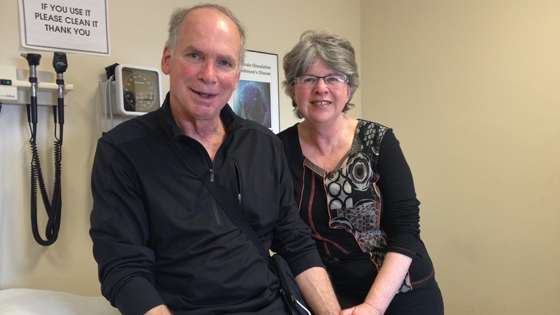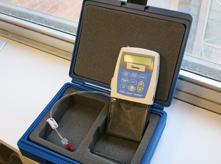
For Ottawa's John Croll and his wife, Ann, the Movement Disorders Clinic at the Krembil Neuroscience Centre has 'made all the difference' in treating John's Parkinson's disease. The white tube along John's left hip links a hole in his stomach to a pump that delivers medication. (Photo: UHN)
April is Parkinson's Month. Currently, 100,000 Canadians are living with the disease. UHN's Movement Disorders Clinic is giving them hope.
Listen closely, and you can hear a tiny click. It's the sound of the pump attached to John Croll's stomach as it administers medication that has put his Parkinson's disease back in check. Just a year ago, he wouldn't have thought that was possible.
Croll, 65, is the first patient in Ontario – outside of a clinical trial – to be treated with Levodopa/Carbidopa Intestinal Gel infusion (LCIG). It's a drug that is continuously delivered to the gut by a pump attached to his stomach.
It's been only nine weeks since John underwent the procedure, but it has already made a world of difference.
"I watched him throw a snowball while playing with our grandkids the other day, and it was truly a remarkable thing," said his wife Ann. "He is now able to play with them instead of just watching from the sidelines."
Even more remarkable is that the possibility for John to be treated with LCIG came up when the Crolls thought there were no other options to manage his quickly worsening condition.

John Croll and his wife, Ann, at their cottage in 2012. (Photo: Croll family)
Parkinson's at age 49
In 1998, John, a former test pilot with the National Research Council of Canada, began to notice a slight tremor in his hand and was having difficulty writing. When the symptoms persisted, he went to see his doctor. John was diagnosed with Parkinson's disease at age 49.
Parkinson's disease is a neurodegenerative disease and a type movement disorder. It is a chronic and progressive illness with symptoms that worsen over time.
The body's movement is controlled by dopamine, a neurotransmitter in our brain. When the cells that produce dopamine begin to die, symptoms of Parkinson's such as slowness, tremor or impaired balance can appear.
Medication and aging
At first, John was able to manage his Parkinson's by taking levodopa, the standard treatment for the illness taken in a pill form. But just a little over a decade later, the medication became less effective and his symptoms weren't controllable.
Unfortunately, John's experience is fairly common among Parkinson's patients: when medication is first administered, patients will experience long durations without being affected by their symptoms as their brain cells can store the medication. But over time, further brain cells begin to die off and this decrease in cells reduces the ability of the brain to store levodopa, making the patient vulnerable to the amount of the drug in the bloodstream.
Also, the stomach of a Parkinson's patient is very slow. The medication can end up sitting in the stomach for a long time without being absorbed, causing it to be less effective or not have any effect at all.
Looking for options
In 2012, John was referred to the Morton and Gloria Shulman Movement Disorders Clinic at the Krembil Neuroscience Centre (KNC) to find out whether he might be a candidate for deep brain stimulation (DBS). The procedure, where two electrodes are implanted in the brain, can effectively treat the Parkinson's symptoms.
But due to the invasive nature of the procedure and potential side effects related to his case, John was advised not to pursue DBS.
"We were very discouraged after that," said Ann. "Although we agreed with the doctor that DBS wasn't the right treatment for John, it meant there was nothing else we could do."
Worsening symptoms, falls
The Crolls returned to Ottawa and did their best to manage John's worsening symptoms. He started to fall a lot more, had trouble sleeping and his walking became very impaired.
"I had some spectacular falls in the middle of the street," John recalled. "I stopped going out and couldn't even go to a restaurant to have dinner with my wife because I was so worried I would fall."
He continued to see his neurologist in Ottawa, but had no expectation that his condition would change.
Hope
But in late 2013, he received an unexpected call from Alejandro (Alex) Valencia, a nurse practitioner with the Movement Disorders Clinic. Alex informed the Crolls that a new doctor had arrived at the hospital and might be able to help.
"At first we thought they wanted us to reconsider DBS so we declined because we still didn't want to pursue it and it was such a big undertaking for John to travel to Toronto," said Ann. "But when Alex called again a month later to insist, we decided to find out what the doctor had to say."

The pump for a Duodopa, a gel pumped directly into the gut so it can be properly absorbed. The medication treats symptoms of Parkinson’s disease. (Photo: UHN)
It was the right decision.
Dr. Alfonso Fasano, a neurologist who joined the Movement Disorders team in 2013, had been treating Parkinson's patients with LCIG for several years while working in Italy. He thought John might be able to benefit from LCIG as well. The drug was developed in Sweden and has been used in Europe for years.
"There are several advantages to treating Parkinson's patients with LCIG," said Fasano. "Because it is pumped into the intestine, it not only places the medication right where it needs to be absorbed, but also gives the dosage minute by minute, evenly and continuously, which is what these patients need."
"Most importantly," he added, "It's another treatment option patients can turn to if they don't qualify for DBS surgery."
'Smiling again'
John instantly agreed to give it a try. After two separate procedures to insert the pump and a few days to monitor his response to the medication, John saw his symptoms begin to improve.
"It's being able to do the little things that has made such a difference to my quality of life," he said. "I can help Ann bring in the grocery bags, I can help more around the house, I'm smiling again."
LCIG isn't currently covered by Ontario's health plan but may be in the near future. The Crolls are grateful for a private insurance plan that has covered the cost of the medication. And they're also very grateful to Fasano and the team at the Movement Disorders Clinic.
"There is a great team of people working here, it's unlike any hospital I've ever been in," said Ann. "For everyone, especially clinic nurse Yu-Yan Poon, to give us such attention and find a treatment option for John when we thought there was no hope, is what told me this was the best neurological centre."
Related Links
